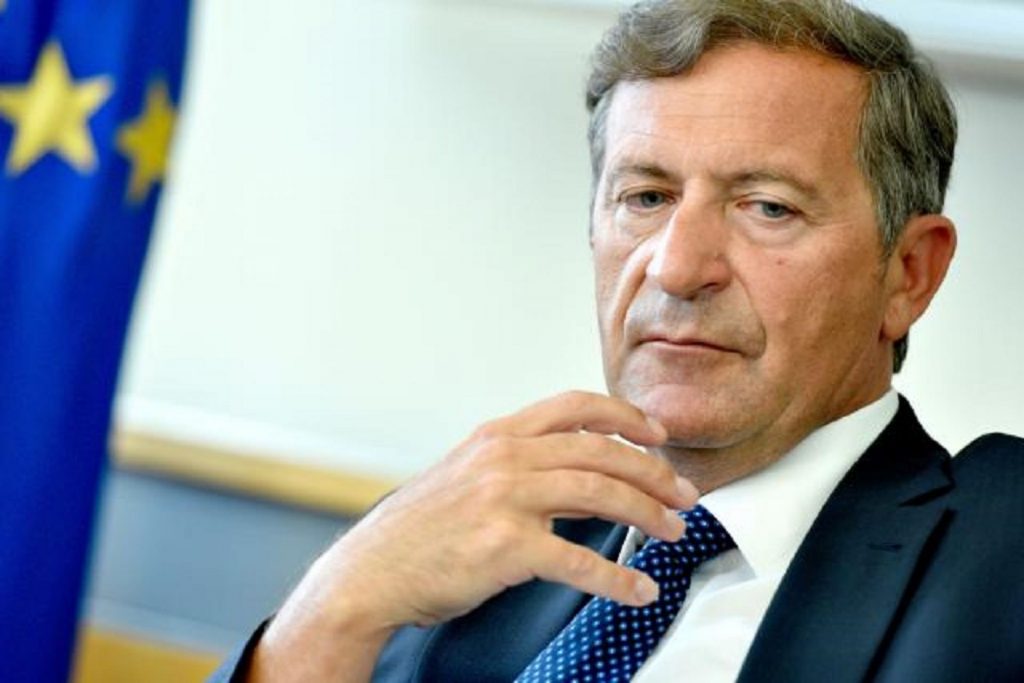By: Gašper Blažič
The former president of DeSUS, Karl Erjavec, is apparently coming out of political retirement. Or rather: he is attempting a comeback. With the blessing of the deep state, he is likely to succeed, and he has more than enough reasons to do so.
Some media outlets have recently highlighted Karl Erjavec’s ambitious and optimistic statements about entering the elections with a new centrist party. Though the political centre is already crowded – with similar plans announced by recently “independent” Anže Logar and National Council President Marko Lotrič – the winner will undoubtedly be the one with the backing of the so-called “uncles”.
The great trickster returns
Why does the long-standing, often written-off former DeSUS president stand a real chance at a comeback? Recall that Erjavec has participated in coalition governments across political lines. DeSUS only gained significant roles in government from 2004 onwards, when Erjavec, a former State Secretary in the Ministry of Justice with an LDS party card (and previously with SKD and SLS), unexpectedly became the Minister of Defence in Janez Janša’s first administration. Soon after, he also became the leader of coalition party DeSUS, previously headed by Anton Rous. The following year, he caused a stir by selecting Patria armoured vehicles over the nearly finalised deal with Sistemska Tehnika for eight-wheeled vehicles. Erjavec avoided jail, while Janša did not. In Borut Pahor’s government, Erjavec was initially Minister of Environment, but he was briefly sidelined before returning in 2012 as Foreign Minister under Janša’s second administration. Just a year later, he joined Gregor Virant in switching support to Alenka Bratušek’s new premiership. He remained Foreign Minister in Miro Cerar’s administration, then returned to the Ministry of Defence in Marjan Šarec’s government. However, just before Šarec resigned amid the looming COVID-19 pandemic, Erjavec lost a party leadership battle to ministerial colleague Aleksandra Pivec. This ultimately enabled the formation of a new government, Janša’s third. Had Erjavec retained DeSUS leadership, it is uncertain whether a new operational government would have formed on the eve of the epidemic. Subsequent events are well-known: the deep state ensured Pivec’s removal from both the Ministry of Agriculture and the party leadership, ending DeSUS’s coalition role. Erjavec briefly returned but did not last, and DeSUS failed to re-enter parliament in the 2022 elections for the first time since it became a parliamentary party in 1996.
Underestimating him is unwise
Several months ago, reports surfaced that Erjavec wanted to re-enter politics with a new party, and he recently reappeared in public when polls suggested that Pavel Rupar and the Voice of Pensioners party might enter parliament. Erjavec’s strategy is predictable: he refrains from naming prominent members of his party but envisions a centre-left coalition that would include his party. He does not rule out cooperation with NSi, which he claims is less radical than SDS. Meanwhile, he consistently speaks out against “new faces,” appealing to critics of the current government and the tried-and-tested tactics of the transition-era left. This is strong evidence that the deep state may aim to siphon some votes from the right via Erjavec. His target group consists of Voice of Pensioners voters, inactive voters unlikely to participate, and disappointed 2022 voters for the Gibanje Svoboda party who were disillusioned by “new faces.” Some political commentators, including Bojan Požar, caution against underestimating Erjavec. Despite his clownish past, he remains a potential threat, angling for votes for a new left-leaning coalition in the next elections, drawing on experience with virtually all parties and prominent politicians. His rhetoric is typically populist and socially demagogic. But if backed by a team like the one Zdenko Roter described in Fallen Masks (2007), Erjavec could genuinely disrupt the political landscape, possibly enabling another “Golobism” term. Moreover, the new coalition could shift further toward a pro-Russian stance, as Erjavec, like Zoran Janković, does not hide his affinity with Moscow. Notably, in 2018, Russian Ambassador Doku Zagaev openly supported Erjavec and DeSUS before parliamentary elections, which mainstream media did not question – unlike in 2012 when U.S. Ambassador Joseph A. Mussomeli made a few public statements around an election ultimately won by Janković, while the U.S. allegedly favoured Janša.
Who tried to undermine Rupar?
Significantly, Erjavec’s publicly stated ambitions coincided with reports of a disruptive shock within the Voice of Pensioners. Late last week, rumours circulated of an attempted coup and extortion against party leader Pavel Rupar by two or three officials. Through social media, Rupar announced the expulsion of the “former vice president, a member of the audit committee, and the vice president of the Radovljica committee for covert and insidious hostile actions aimed at those who seek to destroy and disband us.” He added, “And they were paid for it! Criminal complaints have been filed for abuse of office, unauthorised wiretapping, theft and forgery of documents, as well as for hate speech and spreading falsehoods. They have been active with fake Facebook profiles, emails under the president’s name, calls, and incitement against the president. They were planted among us with a mission from day one, deceiving many with their hypocrisy. They have no place among us anymore.” Rupar did not initially name names, but it later emerged that the alleged conspirators included former vice president Igor Černoga, audit committee member Suad Muslimović, and Radovljica committee vice president Jani Walland, who allegedly threatened Rupar with vengeance unless he relinquished the party, as published by Nova24tv.si. The other side claims this is a complete fabrication, asserting that in January, Rupar allegedly “pocketed” €3,300 from a €5,000 cash fund, leaving only €1,700. Additionally, the Voice of Pensioners party has struggled due to its nascent status and apparent lack of a professional public relations team, which meant the scandal caught them off guard. The timing of Erjavec’s reappearance hints at a deliberate disruption within the party. The only question is who had the motivation for this. Certainly not Rupar. However, this expulsion may have come early enough for the party to recover before the elections.

